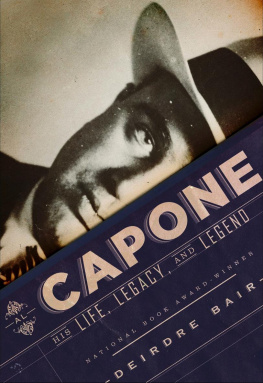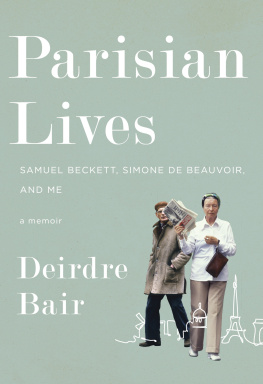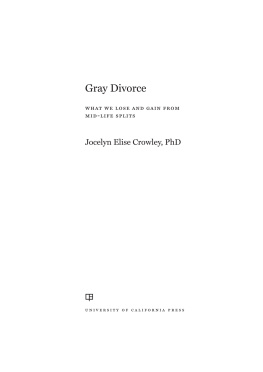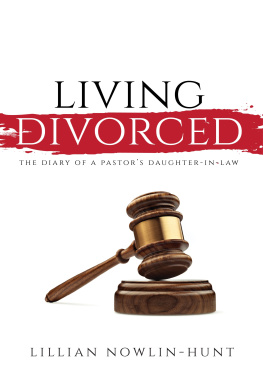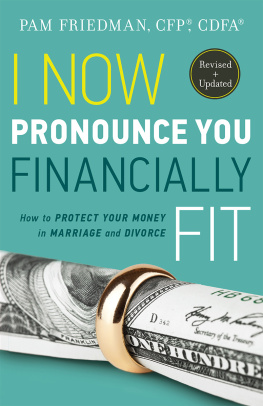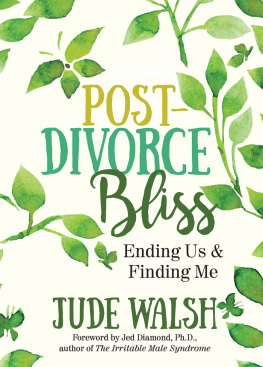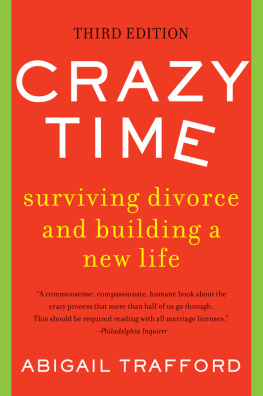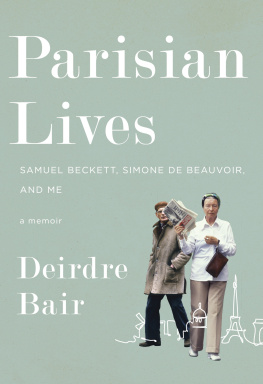ALSO BY DEIRDRE BAIR
Jung: A Biography
Anas Nin: A Biography
Simone de Beauvoir: A Biography
Samuel Beckett: A Biography
Saul Steinberg: A Biography
Calling It
QUITS
Calling It
QUITS
Late-Life Divorce
and Starting Over
Deirdre Bair
Calling It Quits is a work of nonfiction, but the names of the individuals portrayed (other than those whose stories have already appeared in print) have been changed, along with a number of potentially identifying details. Some of the portraits are composites.
Copyright 2007 by Deirdre Bair
All rights reserved, including the right of reproduction in whole or part in any form. For information, address International Creative Management, 730 Fifth Avenue, New York, NY 10019.
Print ISBN: 9780786754885
ebook ISBN: 9780786754892
Distributed by Argo Navis Author Services
For
Judith G. Bartolotta
CONTENTS
NOT EVERY writer finds inspiration for a new book in a dentists office on a sweltering summer day. I was a nervous wreck waiting for what I knew would be the bad news that I needed an implant, and so I thought Id divert myself by reading magazines. There wasnt much on the table and most of itabout hot rods, golf, raising babieswas old and tattered, but at the bottom of the pile I spied what I thought was the best of a bad lot, the magazine for oldsters sponsored by AARP (American Association of Retired Persons).
The cover was like all its others, featuring a photo of a woman who didnt look old enough to be on it (Cybill Shepherd this time), but it was the blurb for one of the articles that caught my attention: The New Divorce: Why More Women Than Ever Are Calling It Quits (and Why Men Dont See It Coming). This was certainly intriguing, because my own divorce happened after forty-three years of marriage, and in the years since I had been told countless stories (whether I wanted to hear them or not) by men and women who had been married a very long time but who had, for whatever the reason, decided to live the next stage of their lives as a single.
Some gave the usual reasons: He traded me in for a trophy wife younger than our daughter or We had nothing in common anymore or I couldnt take his [fill in the blankgambling, drinking, womanizing]. But I also heard a lot of stories from men and women who I thought lived comfortable, contented lives in financially secure marriages and who said that they didnt care what the future might hold, that they divorced because they could not go on living the same old life in the same old rut with the same old boring person. I heard a lot of remarks that all came down to one word: freedom. Womenespecially those women who had jobs outside the homewere tired of taking care of husband, house, and children. Men who divorced told me they, too, were tired of the same old daily grind of working to support wives who did not appreciate them and children who did not respect them. Another remark I heard often from both was Its my time and if I dont take it now, I never will.
So I was naturally intrigued when I saw that the magazines story was about a survey that AARP had commissioned of 1,147 people aged forty to seventy-nine, all of whom divorced between their forties and sixties. The reporter called it groundbreaking because it put the lie to the usual assumptions, that men leave and women seldom find love and/or companionship ever again. The study found that women initiated the divorce more often than men, and if they wanted new love or companionship, they were usually able, eventually, to find it.
The article corresponded in large part to the stories I had been hearing from friends, associates in publishing and academe, and acquaintances everywhere from Paris to Zurich to Sydney, where the research for my biographies took me. People rushed to tell me their stories while I kept mostly silent, probably because I am a curious anomaly: a biographer who writes the intimate details of other peoples lives and tells few of her own. To cover my reticence, I joked, asking if there was something in the drinking water that was making late divorce the worldwide phenomenon it seemed to be.
Some of the stories I heard fell into the same patterns as those in the AARP survey, but most had original and interesting twists. I knew several couples in their eighties who divorced after sixty years of marriage. I knew women who celebrated their fifty-year golden anniversaries by announcing that they would be divorcing within the coming year. One woman had been married for fifty-three years, had never worked outside her home, had no clear idea of how she would survive financially, and had just undergone an organ transplant. She told me, I dont know how many years I have left, I just know I dont want to live them with him! Her ex-husband said he didnt know what hit him when she walked out because he always thought everything was just fine. We never fought, we never raised our voices. And I knew high-level businessmen approaching retirement who told me they were frightened into divorcing because, even though their wives fulfilled every lifestyle-supporting role they needed, from giving exquisite dinner parties to entertaining clients to raising the children alone so they could concentrate on work, there was no intimacy between them in their showcase McMansion homes. One of these men said he could not stand the loneliness any longer, especially now that he and his wife would be together 24/7.
I thought about these stories in the dentists office. Yes, I did need an implant, and we did set up the necessary appointments, but the dentist was puzzled that I seemed more interested in telling him I needed to filch his AARP magazine and beat a hasty exit than in his description of the dire procedures that awaited me. All I could think of was how fast could I get out of his chair and onto the phone with my agent in New York. I had barely begun to explore with her the possibility of turning the intriguing stories I had been hearing into a book when she burst in excitedly to tell me about the late divorces that were almost an epidemic among the chattering classes, as the publishing and writing communities are called. We talked about the writer whose wife of thirty-seven years grew tired of washing his socksyes, washing his socks, not typing his pagesand left him to fend for himself in a Brooklyn loft while she went to Cape Cod to find herself and write her own book, a self-help for other women who call it quits. There was the very rich lady poet (she styled herself that way) whose husband of twenty-nine years (and a figure of respect in his own right but in a different line of work) got tired of holding her two tiny dogs at readings in obscure storefront locations, especially after they became old and incontinent. He left her to go and live in a studio apartment in a poorer part of Manhattan, where he watched television sports and drank beer from the bottle in solitary splendor at the end of his busy workday.
That evening, the agent who represents me in Europe phoned and in the course of conversation I told her about this book about late-life divorce I intended to write. She called the phenomenon the European epidemic and surprised me by saying that it was rampant in France and Germany. Germany, perhaps, I replied, but France? Didnt husbands and wives just go their separate ways, as all the movies and books portrayed French marriage, and didnt they stay married just to keep the money in the family? No longer, the agent said. European divorce statistics are fast catching up to those in the rest of the world. Even China was jumping on the bandwagon.
Next page

